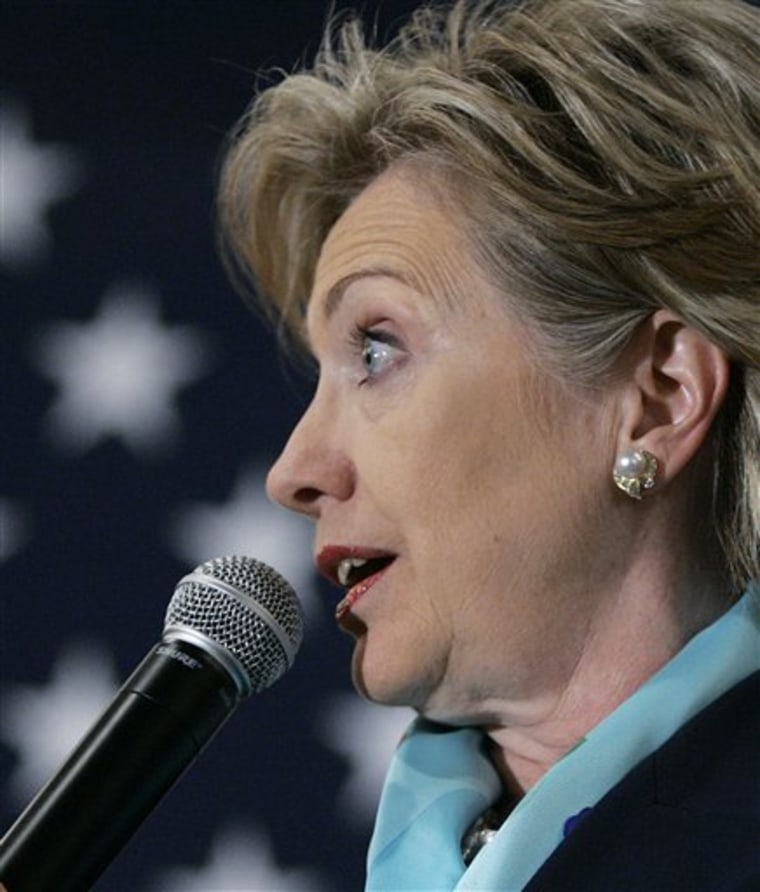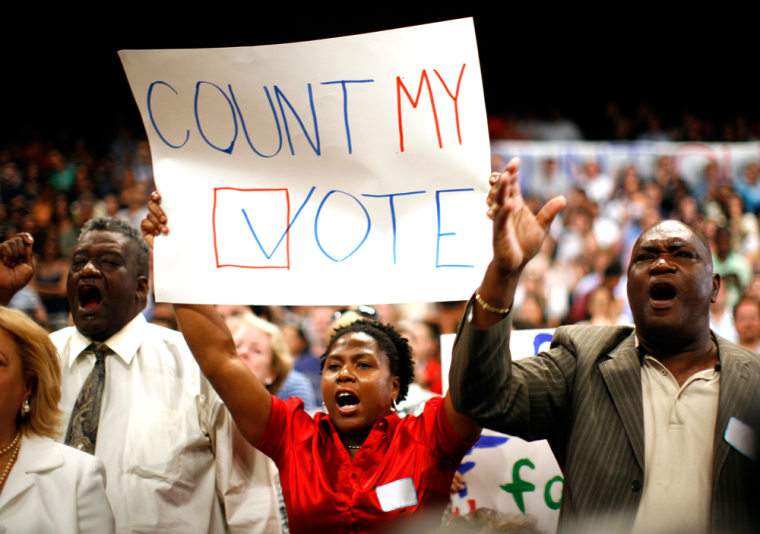There are two nagging questions in the delegate dispute between the Democratic National Committee and the so-called aggrieved parties in Florida and Michigan: 1) What should the DNC do? and 2) What will the DNC do?
Let's start with the first question.
The fact is, the DNC will not be doing what it should do — or at least what members of the Rules and Bylaws committee would like it to do — which is sympathize with Florida and drop the hammer on Michigan.
Michigan would have little chance of seeing its delegation reinstated were the state not so important to the Democratic math and reaching 270 electoral votes in November.
The blame game
Many members of the DNC's Rules Committee are still livid. They blame Michigan for creating this mess.
In 2005 and 2006, Michigan helped start the discussion to determine how the Democrats would organize their 2008 calendar. When it was determined the Democrats were going to allow four states to break the Feb. 5 primary window, a number of states applied to be one of those four, including Michigan. When their bid was turned down — and despite numerous warnings, as well as the unprecedented decision to strip Florida of its delegates — Michigan's Democratic leaders went ahead and scheduled an early primary anyway.
No one on the Rules Committee, even the Clinton partisans, can stomach the idea of giving in to Michigan.
The good news for Michigan, however, is the folks on the Rules committee do not live in a political vacuum. They know they can't have angry Democrats like Gov. Jennifer Granholm and Sen. Carl Levin stewing all summer while the Obama campaign attempts to organize the state.
So from the start, a decision to seat some of Michigan's delegates means members of the Rules committee are already doing what they believe they shouldn't be doing.
The Michigan folks lobbying the Rules Committee ought to keep this in mind, even though they believe they are in the right. The more humble pie Granholm and Levin agree to eat, the better their chances are at avoiding a messy confrontation in the future.
Options for the committee
There are other options the Rules Committee should be considering but won’t.
Why not consider punishing the party leaders and not the voters? Couldn’t the committee take away the states' superdelegate votes? After all, it wasn't the voters who demanded the states break party rules, but rather the leaders of the respective state parties.
Of course, this is too logical. The likely ruling on Saturday will probably highlight the party's inability or reluctance to punish the superdelegates. There is a challenge from a Florida superdelegate claiming the party violated its own charter by stripping the state of both pledged delegates and superdelegates. Most members of the Rules Committee I've talked to indicate that he may be right. Keep in mind members of the Rules committee are all superdelegates themselves.
The Golden Rule could apply: Do unto other superdelegates as you would want done unto you.
The second idea the committee should be considering but isn't reflects everything we've learned throughout this long primary season.
As many have noted, census data for each state have been remarkably determinative of results since Super Tuesday. In fact, the support groups for the two candidates have been incredibly stable. Why not apply what we've learned about the support groups of both candidates and split the delegates accordingly?
I guarantee you that the chief delegate counters of both campaigns as well as a few observers (like Democratic numbers guru Mark Gersh) could get together in a room and agree on which congressional district each candidate would carry and by what percentage within, say, 5 points.
What could have happened
A few weeks ago, I attempted to simulate what the results would be in Florida and Michigan had both primaries taken place after March 4 when both candidates were at their full strength with their respective demographic groups. After interviewing experts in both states, my simulation gave Florida to Clinton by a margin of about six points (53-47), netting her nine delegates (97-88).
In Michigan, my experts believe timing would have been everything. Had the primary been in March, these folks gave it to Obama by 2 points. Had the primary been held post-Rev. Wright and the “bitter-cling” comments, our experts believe Clinton would have eked out a win. Nobody believed either was capable of anything more than an Indiana or Missouri margin for either candidate.
My simulation gave Michigan to Clinton, 51-49, which would have netted her approximately 4 delegates (66-62).
But what should be done is different from what will be done.
Two nearly indisputable predictions about Saturday are: There is no chance nothing will be done, and the entire delegations from both states will not be seated.
We do know the current magic number of 2,026 will not be in effect come Sunday and we know the magic number will not be 2,210, as hoped for by the Clinton campaign.
It is likely to be either 2,118 or 2,131, depending on whether the Rules Committee decides superdelegates should be penalized (or can be) in the same vein as pledged delegates.
Then the question becomes how will the Florida and Michigan delegates be allocated?
Decisions, decisions

First thing the Rules Committee must decide is whether or not the January votes in both states should be used to determine the delegate allocations. The tea leaves indicate Florida's results will get accepted. However Michigan is an open question.
There are some DNC hardliners who will be adamant about not accepting the January results even as a guide because it will only open the door for other states (and future candidates) to violate the rules in the future.
Still, the Obama campaign seems open to accepting Florida as is (as long as the 50 percent cut is enforced) which means Florida is likely to "count." Of course, there is a significant difference between delegations being cut in half and cutting every delegate's vote in half. It's odd math, but it's a difference of as many as 13 delegates for Clinton.
Meanwhile, the latest rumor about Michigan indicates their vote won't count, but instead a compromise of a 50-50 even split of delegates will be agreed on.
Whatever happens, it is not going to seem fair to someone. But it may not even matter. It is likely Obama will ask for the delegations to be seated in full once he's secured the nomination.
The sad irony for both states is clear: If they hadn't been so obsessed with an early primary, they both would have been a heck of a lot more consequential than they've turned out to be.
